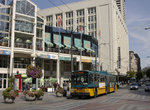Seattle Trolley Coaches
![]()
King Country Metro Gillig Trolley Coach no. 4123 at Pine Street/4th Avenue inbound. Photo by Peter Ehrlich, September 2009.
Overview
In 1940, the city of Seattle, which operated an extensive but rundown streetcar network plus three cable car lines, replaced everything with a new network of trolley coach routes. These served Queen Anne Hill, the northern corridor up to the University District, Capitol Hill and First Hill, the Rainier Valley and West Seattle. A fleet of 252 trolley coaches were purchased, 100 being constructed in the Seattle area itself by Pacific Car and Foundry under license from J. G. Brill. Most of the others were manufactured by Fageol/Twin Coach of Kent, Ohio. A few years later, additional Twin Coaches arrived, followed by 15 Pullman coaches diverted by the Office of Defense Transportation from a wartime order for Columbus, OH, and closing out with 15 more Pullmans built new for Seattle in 1944.
The status quo prevailed in Seattle through the 1962 World's Fair. But in 1963, the system underwent a major retrenchment, and all but one of the PCF-Brills, plus more than half of the 1940 Twin Coaches were scrapped. The hilliest routes were retained, but most of the "flatland" routes went diesel. The fleet then consisted of 60 Twins that received some refurbishment for the Fair; 24 "Sport Twins" from 1943, and all of the Pullmans. In 1970, some more routes were dieselized. and the fleet, by now the oldest operating in the United States, was down to 35 of the 1940 Twins, eight Sport Twins, and the last 15 Pullmans.
By 1976, it was clear that this "rolling museum" couldn't endure much longer. The wires, power systems and feeder cables were wearing out. And transit officials were watching other transit systems like Toronto, Hamilton, Boston, Edmonton and San Francisco deploying modern trolleybuses on their systems. were Seattle Metro, the system operator that was reorganized from the old Seattle Transit System, started to develop plans for a complete rejuvenation that would require rebuilding from the ground up. In January 1978, Seattle's original trolley coach fleet was retired. Many coaches, including PCF-Brill 798, which was brought back from a Washington State trolley museum and restored, were saved in the historic fleet. Others went to Orange Empire Railway Museum, and San Francisco Muni has one.
In 1980, an entirely new trolley coach system, featuring the latest in overhead technology, including radio/turn signal-controlled switches, state-of-the-art power distribution systems, and a fleet of 109 new 40-foot lift-equipped AM General trolley coaches, operating on most of the hilly lines and a few new lines, including a crosstown line between the Ballard district and the University of Washington, a route that had never been trolley coach. The AMGs carried fleet numbers 900-1009 (no 911). In 1986, 46 new M.A.N. articulated trolley buses, 4000-4045, joined the fleet, and these went on the heavy 7-Rainier and 44-Ballard/University routes.
In the late 1980s, in an effort to reduce bus traffic in downtown, the City of Seattle and Seattle Metro designed and constructed the Downtown Seattle Transit Tunnel (see Metro Tunnel section for pix) and purchased a large fleet of Breda duo-mode articulated buses, 236 in all,numbers 5000-5235. The Bredas, which entered service in 1990, operated as ETBs through the tunnel, but once the reached Convention Place in the north or International District in the south, they dropped their poles and changed over to diesel power, running long routes north, east and south, and into the suburbs. Twenty of these were assigned to Sound Transit, and operated routes into Pierce County.
There were two developments which affected the existing fleet in the early 2000s. First, the AM General fleet became life-expired, but King County Metro, in order to save money, ordered 100 40' bus bodies from Gillig of Hayward, CA. They took the motors and controls out of the AM Generals, overhauled them in-house, and installed them in the new bodies. The result is a solid coach which should last dozens of years. The Gilligs carry fleet numbers 4100-4199. The last AM Generals operated in 2003; 1008 is in the historic fleet.
Faced with the need to replace both the cantankerous Breda duo-mode buses and the M.A.N artic trolleys, coupled with the shutdown of the tunnel in September 2005 for conversion to shared LINK Light Rail/ hybrid bus operations, King County Metro converted 59 Bredas to straight trolley coach between 2003 and 2006 to replace the M.A.Ns. These are numbered 4200-4258.
Meanwhile, the last Breda duo-mode ran in revenue service on January 24, 2005. New Flyer hybrid low-floor artics felled the Bredas, and other than the 59 conversions, the duo-modes were scrapped or held for parts sources. Breda 5034 was held for the historic fleet.
The Gilligs operate on hilly routes like lines 2/3/4 Queen Anne; 10- Capitol Hil/Mt. Baker, 36-Jefferson Park, 70-Eastlake and many others. The Bredas cover heavy routes like 7-Rainier, 43-Montlake, 44-Ballard/University and 49-University/Downtown. When the Fare-Free zone in downtown Seattle is in effect, riders pay when boarding on inbound trips, and pay when leaving on outbound. At other times, fares are paid on boarding only. Transfers for 2 hours are issued, and passes are available.
Photo Gallery
| Five Random Images | ||||
 Image 93235 (221k, 930x618) Photo by: Peter Ehrlich |  Image 93238 (206k, 930x618) Photo by: Peter Ehrlich |  Image 93241 (229k, 930x610) Photo by: Peter Ehrlich |  Image 93246 (209k, 930x618) Photo by: Peter Ehrlich |  Image 106187 (256k, 930x618) Photo by: Peter Ehrlich |
Links
Official Site - King County Metro. The official site of King County Metro, including schedules, fares, and more.
Page Credits
By Peter Ehrlich.